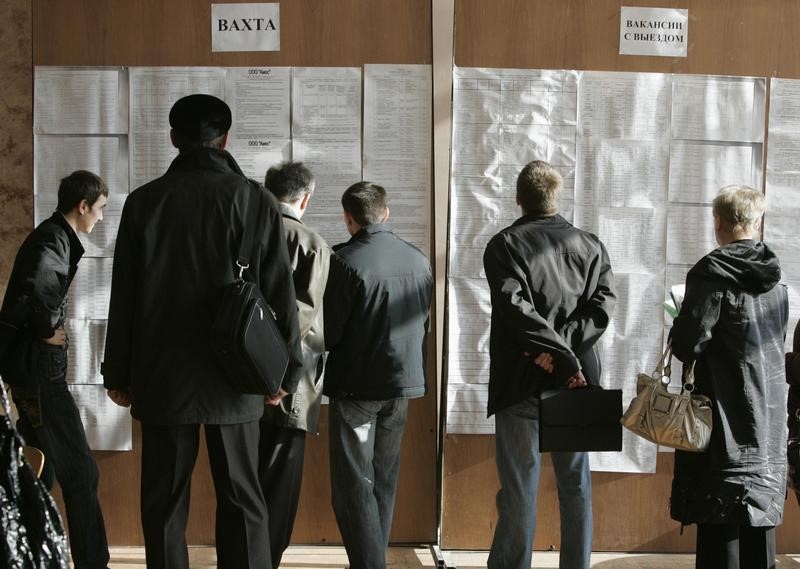By Lidia Kelly and Elena Fabrichnaya
MOSCOW (Reuters) - The Russian economy stagnated in November, data published on Wednesday showed, making it even more likely that the rouble's rapid collapse so far this month will push it into recession next year.
Investment by Russian companies, once a staple of the country's economic performance, fell sharper than expected last month, underlining pressure from Western sanction imposed on Moscow for its role in the Ukraine crisis.
Retail sales rose in line with expectations, but at a 1.8 annual increase they were a fraction of what their rise had been in the post-2008 crisis when consumer demand fuelled the economy.
The set of data, which also noted some increase in real wages, follows industrial production numbers, released on Monday, showing that industry output disappointed last month, falling by 0.4 percent, against analysts' expectations of a 1.1 percent rise.
"In general the picture is still of an economy that is stagnating rather than collapsing," Liza Ermolenko, emerging markets economist at Capital Economics in London, said in a note.
"The key point however is that these data predate the recent collapse in the rouble. The full effect of the recent events on the Russian economy will only start to show up in activity data next year, but the short point is that Russia is heading for a deep recession in 2015."
The rouble, which fell against the dollar by as much as 20 percent at one point earlier this week, is now trading some 45 percent lower for the year to date
This poses a major challenge for President Vladimir Putin whose popularity, based partly on providing stability and prosperity, is at risk from the rouble fall damaging Russia's credibility among investors.
Weak oil prices, combined with Western sanctions imposed on Russia for its role in the Ukraine crisis, have significantly limited access to foreign funds, creating concerns that many heavy-leveraged companies may not be able to repay their debts.
"The risks of falling oil prices create additional pressure on the rouble .. it will lead to increase in inflation, maintaining tight monetary policy and to the rising cost of borrowing," said Maria Pomelnikova, an analyst at Raiffeisen bank in Moscow.
On Wednesday, the central bank said it was ready to take additional measures that would lead to faster stabilisation of the rouble and ease worries among companies over their debt burden.
The rouble firmed after the announcement, but official forecasts for the economy for next year are gloomy.
The central bank said on Monday it was likely the economy would contract in the first quarter of next year and that it could shrink perhaps by around 4.5 percent in 2015 as a whole if oil prices average $60 (38 pounds) a barrel.
On Tuesday, oil, Russia's chief exports, Brent crude oil fell below $59 a barrel, near 5-1/2-year lows.

"Things have undoubtedly got considerably worse since November, but this is yet to be reflected in hard data," Capital Economics' Ermolenko said.
(Additional reporting by Alexander Winning, Katya Golubkova and Maria Kiselyova; Writing by Lidia Kelly Editing by Jeremy Gaunt)